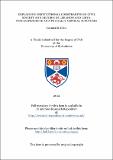Files in this item
Explaining institutional constraints on civil society and reform in Lebanon and Libya : path dependence and ‘partially’ critical junctures
Item metadata
| dc.contributor.advisor | Volpi, Frédéric | |
| dc.contributor.author | Geha, Carmen | |
| dc.coverage.spatial | 251 | en_US |
| dc.date.accessioned | 2014-12-18T15:12:00Z | |
| dc.date.available | 2014-12-18T15:12:00Z | |
| dc.date.issued | 2014-12-01 | |
| dc.identifier.uri | https://hdl.handle.net/10023/5939 | |
| dc.description.abstract | This thesis is an inquiry into the challenges to the role of civic organisations in political reform during and after political transitions. The major question this research addresses is: How do institutions and institutional dynamics constrain political reform during a transition? The thesis examines how demands for reform by non-governmental organisations in Lebanon and Libya were not translated into concrete political decisions taken by regimes during a transition period. The thesis suggests that the combination of weak states and power-sharing agreements marginalizes civic organisations, and poses institutional constraints on the likelihood of reform. The thesis is based on contemporary research on events and reform trajectories in Lebanon and Libya, with a focus on the demands and strategies employed by activists during periods of transition. Lebanon between 2005 and 2010 and Libya between 2011 and 2013 underwent critical political events but subsequently did not adopt political reforms despite demands by civic organisations in two main areas: the electoral system in Lebanon and the constitutional process in Libya. A study of these two reform campaigns reveals deeply entrenched historical patterns and elements of continuity that led to path dependent outcomes during transition. By utilising theory and concepts from the perspective of historical institutionalism, the thesis identifies the factors behind path dependent outcomes in Lebanon and Libya. I argue that the transitions in Lebanon and Libya were a result of only ‘partially’ critical junctures. The thesis builds on the approach of path dependence by offering insights as to how historically inherited institutional dynamics from the previous regime can cause junctures to be only ‘partially’ critical for the broader political order. The main source of data comes from participant observations, interviews and focus groups with two organisations that tried to advance electoral reform and constitutional development. | en_US |
| dc.language.iso | en | en_US |
| dc.publisher | University of St Andrews | |
| dc.subject | Lebanon | en_US |
| dc.subject | Libya | en_US |
| dc.subject | Civil society | en_US |
| dc.subject | Political reform | en_US |
| dc.subject | Elections | en_US |
| dc.subject | Constitutional development | en_US |
| dc.subject | Path dependence | en_US |
| dc.subject | Critical junctures | en_US |
| dc.subject | Weak state | en_US |
| dc.subject | Power sharing system | en_US |
| dc.subject | Sectarianism | en_US |
| dc.subject | Historical institutionalism | en_US |
| dc.subject.lcc | DS87.54G4 | |
| dc.subject.lcsh | Lebanon--Politics and government--21st century | en_US |
| dc.subject.lcsh | Libya--Politics and government--21st century | en_US |
| dc.subject.lcsh | Legislative bodies--Reform | en_US |
| dc.subject.lcsh | Constitutional law--Libya | en_US |
| dc.subject.lcsh | Civil society | en_US |
| dc.title | Explaining institutional constraints on civil society and reform in Lebanon and Libya : path dependence and ‘partially’ critical junctures | en_US |
| dc.type | Thesis | en_US |
| dc.type.qualificationlevel | Doctoral | en_US |
| dc.type.qualificationname | PhD Doctor of Philosophy | en_US |
| dc.publisher.institution | The University of St Andrews | en_US |
This item appears in the following Collection(s)
Items in the St Andrews Research Repository are protected by copyright, with all rights reserved, unless otherwise indicated.

